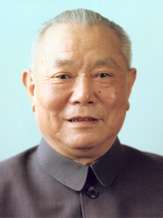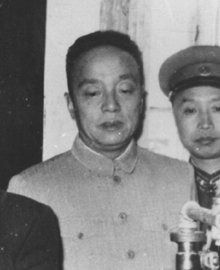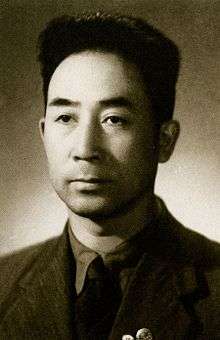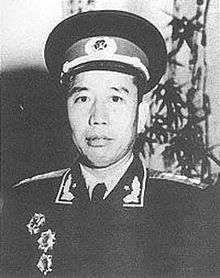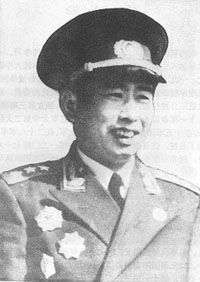Eight Elders
The Eight Great Eminent Officials (Chinese: 八大元老; pinyin: Bā dà yuánlǎo), abbreviated as the Eight Elders (Chinese: 八老; pinyin: Bā lǎo), were a group of elderly members of the Communist Party of China who held substantial power during the 1980s and 1990s. In the English-speaking world, these men are often called The Eight Immortals as an allusion to the Taoist deities commonly known as the Eight Immortals.[1]
Membership
The Eight elders were:
Role in "strongman politics"
The politburo system was created by the Bolsheviks in 1917, when Vladimir Lenin established it to command and control the October Revolution. It was later adopted by the Chinese communists. In both the early Chinese and Russian politburos, "strongman politics" played a large role in internal decision-making. Politburos under both Joseph Stalin and Mao Zedong were later criticized for being dysfunctional and largely decorative, allowing the top leaders to dictate both party policy and the fate of the other leaders.
Under Deng Xiaoping, important decisions were often made in Deng's home with a caucus of eight senior party cadres, called "Eight Elders". Deng ruled as paramount leader, although he never held the top title of the party or the state. However, Deng was able to remove three Party leaders with the aid of the Eight Elders. Hua Guofeng was gradually removed from Premier and Party Chairman between 1980 and 1981; Hu Yaobang was removed in 1987; and, Zhao Ziyang was removed in 1989.[2]
Descendants
Descendants of the Eight Elders who have benefited significantly from nepotism and cronyism constitute a group now known as "the Princelings" or the "Crown Prince Party". Its members, rising through party ranks, can easily overrule any opposition in their jurisdictions, even if they are assigned to a local administrative position. They are often seen to outrank other party officials and possess greater prestige due to their lineage.[2] Bloomberg has reported on the extensive wealth accumulated by these descendants via their roles in various public and private companies.[3]
See also
References
- ↑ Joseph, William A. (2010). Politics in China: An Introduction. Oxford: Oxford University Press. p. 112. ISBN 978-0-19-533530-9.
- 1 2 Xiang, Lanxin (Apr 20, 2012). "Bo Xilai probe shows up China's outdated system of government". South China Morning Post
- ↑ "Heirs of Mao's Comrades Rise as New Capitalist Nobility". Bloomberg. Retrieved December 28, 2012.
External links
- AsiaWeek article
- John Ruwitch 'China's leaders tug strings of power in retirement' (Reuters)
.jpg)

